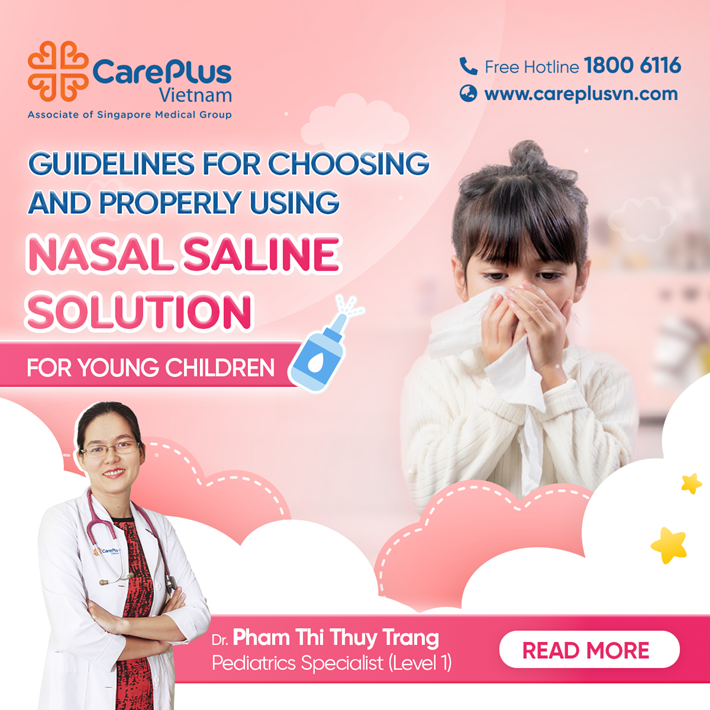PROPER NASAL IRRIGATION – A SIMPLE YET POWERFUL WAY TO PROTECT YOUR CHILD’S RESPIRATORY HEALTH!

7/18/2025 2:46:23 PM
PROPER NASAL IRRIGATION – A SIMPLE YET POWERFUL WAY TO PROTECT YOUR CHILD’S RESPIRATORY HEALTH!
👩⚕️ According to Dr. Pham Thi Thuy Trang – Pediatric Specialist (Level 1) at CarePlus Clinics:
The nose is the body’s first line of defense against harmful agents like bacteria, viruses, fine dust, and pollen. That’s why keeping the nasal passages clean and clear is a simple yet effective way to protect your child’s respiratory system—especially during cold and flu season or seasonal weather changes.
Saline nasal irrigation is a widely recommended method for young children due to its safety, ease of use, and minimal side effects. However, many parents are still unsure which type to choose, how to use it properly, and when it’s necessary.
👉 Let CarePlus guide you through proper nasal care to help your child breathe easier every day!
1. Types of Nasal Saline Solutions
🔹 By salt concentration:
-
Isotonic saline (0.9%) – Gentle and suitable for daily use, with low risk of irritation.
-
Hypertonic saline (2–3%) – Helps reduce swelling of the nasal mucosa, useful for nasal congestion and rhinitis.
🔹 By method of application:
-
Mist spray or nasal drops – Ideal for infants and young children.
-
Large-volume irrigation (10–200 ml) – Recommended for older children and adults; proper technique is essential to avoid nasal mucosa injury.
2. Why Daily Nasal Hygiene Is Important for Children
-
Removes dust, pollen, viruses, and allergens.
-
Helps maintain moisture and the natural filtering function of nasal cilia.
-
Reduces the risk of colds, rhinitis, and respiratory infections within the household.
-
Especially beneficial during dry, cold weather or when your child has nasal congestion.
3. Benefits of Nasal Irrigation During Respiratory Illnesses
📍 For upper respiratory tract infections:
-
Provides quick relief from nasal congestion and runny nose.
-
Reduces the need for antibiotics and other medications.
-
Shortens the duration of illness by an average of 2 days compared to no nasal irrigation.
-
Helps limit the spread of viruses to other family members.
📍 For allergic rhinitis:
-
Effectively relieves symptoms like itching, runny nose, and congestion.
-
Reduces the required dosage of antihistamines and corticosteroids.
-
Enhances treatment outcomes when used in combination with prescribed medications.
4. High Safety – Child-Friendly
-
Side effects are rare and usually mild—such as slight discomfort or minor nosebleeds.
-
Mist sprays and drops are especially suitable for children.
-
No serious side effects have been reported in clinical studies.
5. Conclusion
Incorporating nasal irrigation with saline solution into your child’s routine offers significant health benefits:
✔ Supports effective treatment of upper respiratory illnesses
✔ Helps children breathe easier, sleep better, and eat well
✔ Reduces the need for antibiotics
✔ Limits the spread of viruses in the community
✔ Improves overall quality of life for the whole family